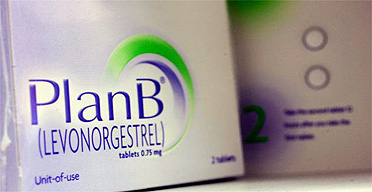
Giving women the morning-after pill makes no difference to either the pregnancy rate or the abortion rate, a family planning expert says today.
Contrary to assumptions, says Anna Glasier, director of the Lothian primary care NHS trust in Edinburgh, several studies - including one that she herself led - have shown that even giving women packets of morning-after pills to keep at home in case they need them does not reduce the proportions having unplanned babies or terminations.
Often the problem is not with the pills but in the way they are used.
"When reasons for not using emergency contraception, despite having a supply at home, were documented, three out of every four women said they did not realise they had put themselves at risk of pregnancy," she writes in the British Medical Journal today.
The focus should be on getting people to take precautions before or during sex rather than afterwards, she argues.
The introduction of emergency contraception has been highly controversial in some quarters. In the US, the Food and Drug Administration has only recently recommended after a three-year delay that what is known there as Plan B should be sold over the counter, with restrictions.
In the UK, there has been alarm over provision of the morning-after pill in schools to under-age girls without their parents' knowledge.
But the evidence for its efficacy are not strong, says Professor Glasier.
There has never been a placebo-controlled trial of the morning-after pill for ethical reasons. "Despite the clear increase in the use of emergency contraception, abortion rates have not fallen in the UK. They have risen from 11 per 1,000 women aged 15-44 in 1984 (136,388 abortions) to 17.8 per 1,000 in 2004 (185,400 abortions)," she writes. Sweden shows the same pattern, she says. The estimates of efficacy could well be skewed by the inadequacy of the information researchers are given by some women using the pill. "Many women using emergency contraception have recently had unprotected intercourse more than once, many are vague about the date of their last period, and a few were too drunk to be sure they had even had sex."
She asks whether emergency contraception is worth the fuss. For a woman who has had unprotected sex it is, "because emergency contraception will prevent pregnancy in some women some of the time - and if you don't want to get pregnant anything is better than nothing".
But, she continues: "If you are looking for an intervention that will reduce abortion rates, emergency contraception may not be the solution, and perhaps you should concentrate most on encouraging people to use contraception before or during sex, not after it."
The Family Planning Association said that emergency contraception was an important method for women whose contraception had failed or who had had unprotected sex.
"Emergency contraception is no substitute for correct, regular use of contraception. It is not, and was never intended to be, a panacea for abortion," said Toni Belfield, of the FPA. "Preventing unplanned pregnancy is a complex issue that encompasses attitudes towards risk taking behaviour, knowledge of contraceptive methods, ability to negotiate the use of contraception with partners and discuss sex openly."
Backstory
The morning-after pill was first used in the 1970s, but remained a well-kept secret until the 1990s. In recent years its use has taken off, but abortions continue to rise. In 2002, the latest figures available, there were 175,600 abortions in England in Wales or 16.9 per 1,000 women aged 15-44.
Most of the controversy in the UK has been around access to the pills by girls without parents' knowledge. Britain has the highest rates of teen pregnancy in Europe, at 41.5 per 1,000 girls of 15-17 in 2004. Some 46% of those ended in abortion. Over the counter, the pills are expensive.

